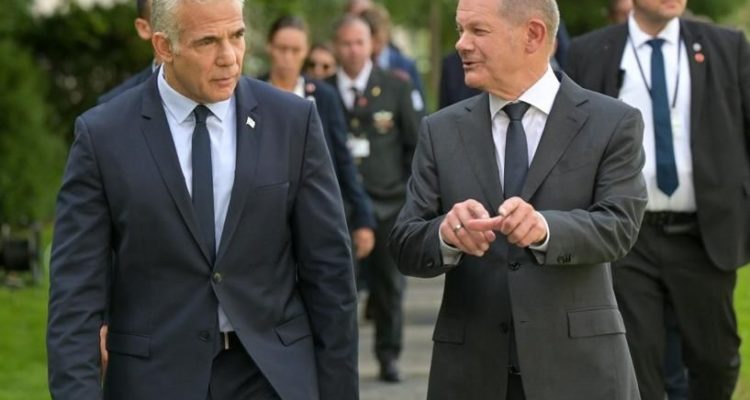Israeli Prime Minister uses Berlin address alongside German chancellor to urge West to retain sanctions against Tehran and to come up with new strategy for Iran’s nuclear aspirations.
By World Israel News Staff
Israeli Prime Minister Yair Lapid on Monday said that efforts to restore the 2015 agreement had “failed.”
He made his remarks alongside German Chancellor Olaf Scholz, with whom he was meeting in Berlin.
The two leaders discussed Iran and the deadlocked nuclear talks in Vienna, as well as the ongoing war between Russia and Ukraine, and efforts to strengthen ties between Israel and Germany.
Following their meeting, Lapid and Scholz held a joint press conference in Berlin.
Lapid urged European powers and the U.S. to maintain their sanctions on Tehran, and to come up with a new strategy for curtailing Iran’s nuclear aspirations.
“Talk does not stop evil,” said Lapid, calling on world powers to challenge both Iran’s efforts to acquire nuclear weapons and its support for terrorism.
“Liberal democracies must be willing and able to defend themselves. Sometimes, freedom must be defended with force.”
“Our partnership also requires us to act together against the growing threat of Iran becoming a nuclear state. Germany is one of the E3 countries, and this is part of the responsibility it has taken upon itself.”
“It is time to move past the failed negotiations with Iran. They cannot and will not achieve the goal we all share – to stop Iran getting a nuclear weapon.”
Scholz and Lapid “discussed the need for a new strategy to stop Iran’s nuclear program,” the prime minister continued.
“A nuclear Iran will destabilize the Middle East, and create a nuclear arms race that will endanger the entire world. Returning to the nuclear agreement, under the current conditions, would be a critical mistake.”
“Removing sanctions and pouring hundreds of billions of dollars into Iran will bring waves of terrorism, not only to the Middle East, but also across Europe.”
Instead of a return to the 2015 nuclear deal, Lapid suggested that alliances between Israel and moderate Arab states could serve as an example for another strategy.
“There is another way. A better way forward for the Middle East. It is the path of the Abraham Accords and the Negev Forum. A path based on a shared vision for the region. A vision not of war, extremism and terrorism but of peace, tolerance and cooperation.”
Hours later, a senior Israeli official confirmed that Western powers no longer believed the Iran deal was in the offing. According to the official, who traveled as part of Lapid’s delegation to Germany, Israel had revealed intelligence to both the deal’s U.S. and European partners that proved that Tehran was lying throughout the Vienna-based talks.




